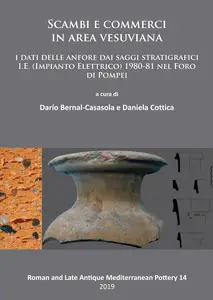
Free Download Scambi e commerci in area vesuviana: I dati delle anfore dai saggi stratigrafici I.E. (Impianto Elettrico) 1980-81 nel Foro di Pompei (Roman and Late Antique Mediterranean Pottery) by Darío Bernal-Casasola, Daniela Cottica
English | January 31, 2020 | ISBN: 1789693233 | 360 pages | PDF | 15 Mb
Transport amphorae are one of the best archaeological indicators for evaluating the economy and trade of societies in the ancient world. Scambi e commerci in area vesuviana: i dati delle anfore dai saggi stratigrafici I.E. (Impianto Elettrico) 1980-81 nel Foro di Pompei, produced by researchers from the University of Cadiz and the Ca’ Foscari University of Venice, includes the study of nearly five hundred of these commercial containers, recovered during the pioneering stratigraphic excavations carried out in 1980-1981 at the Forum of Pompeii, called conventionally "Impianto Elettrico".
The work represents the first Pompeian monograph dedicated exclusively to the analysis of the amphoric evidence brought to light by archaeological excavation activities in the city buried by the eruption of Vesuvius and analyses in diachronic perspective the main productions in circulation between the VI / V BC and the year 79 AD. The chapters of the volume offer the reader data relating to archaic amphorae, Greek amphorae and Italic wine amphorae from the Republican era, which draw a commercial panorama of great vitality. The African amphorae, following Punic traditions, are then reviewed; then follow the Punic-Gaditan garum amphorae, identified for the first time in the Vesuvian area in this study; le Dressel 21-22, containers for the Italic fish-salting trade and, finally, the productions of the late Republican and Julio-Claudian period. The volume is completed by a series of complementary archaeometric studies carried out on some of the amphorae (paleocontent organic residue analysis and petrographic characterization of the fabrics).
All this material, analyzed with an integrated and interdisciplinary approach, allows us to draw multiple conclusions, fundamental to understanding the rich and articulated daily history of Pompeii, its merchants and its inhabitants (the consumers to whom the amphorae were intended) but also useful to better define the Economic History of some of the circum-Mediterranean regions (from Gades to the Aegean) with which Pompeii had strong trade ties in Antiquity, as evidenced by the amphorae presented here.
Table of Contents
Prefazione (Darío Bernal, Daniela Cottica)
Introduction. Pompeii revisited. The ‘excavation’ of an excavation: Pompeii I.E. 1980-81 (Paul Arthur)
Dal frammento al suo significato: genesi, limiti e potenzialità (Daniela Cottica)
Alle origini
Anfore arcaiche in Campania e a Pompei (Francesca Marucci)
L’espansione dei traffici fra III secolo ed eta’ tardo-repubblicana
Greek amphora stamps and amphora fragments (Gerald Finkielsztejn)
Non solo Vesuvinum ma anche Falernum e Setinum: le anfore italiche dei contesti I.E. (Luana Toniolo)
Las importaciones anfóricas de tradición púnica procedentes del Mediterráneo Central (Antonio M. Sáez Romero, José Ángel Zamora López)
Garum y salsamenta de la Hispania Ulterior. Primeras identificaciones de ánforas de producción púnico-gaditana en Pompeya (Darío Bernal, Antonio M. Sáez)
Da Augusto all’eruzione del 79
Pescado itálico en el Impianto Elettrico. Reflexiones sobre la filiación de las ánforas Dressel 21-22 (Darío Bernal, Daniela Cottica)
Apuntes sobre la evolución de las relaciones interprovinciales a través de las ánforas (Macarena Bustamante, Darío Bernal)
Archeometria, sigillatura e riuso delle anfore
Le analisi dei residui organici e la determinazione del contenuto di alcune anfore del Progetto Impianto Elettrico (Alessandra Pecci, Gianluca Giorgi)
Studio archeometrico di alcuni gruppi di anfore del Foro di Pompei (Anna Maria De Francesco, Roberta Scarpelli, Annamaria Ciarallo, Luigi Buffone)
Sistemas de hermetización de las ánforas del proyecto I.E. (Antonio M. Sáez, Darío Bernal)
Da contenitori a manufatti polifunzionali: modalità e tecniche di reimpiego delle anfore nei contesti I.E. (Luana Toniolo)
Riflessioni generali
Alcune riflessioni sui flussi di scambio a Pompei attraverso lo studio delle anfore dagli scavi I.E. del foro (Darío Bernal, Daniela Cottica)
Proyectos in itinere y perspectivas futuras de investigación sobre las ánforas de Pompeya (Albert Ribera i Lacomba)
Appendici
Catalogo anfore Pompei-Impianto Elettrico 1980-81 (Luana Toniolo, Antonio M. Sáez, Elisa Tomasella, Macarena Bustamante)
Distribuzione dei reperti nei contesti di scavo (Luana Toniolo)
Apparato grafico
Tavole
Tavole con le macrofotografie degli impasti ceramici
